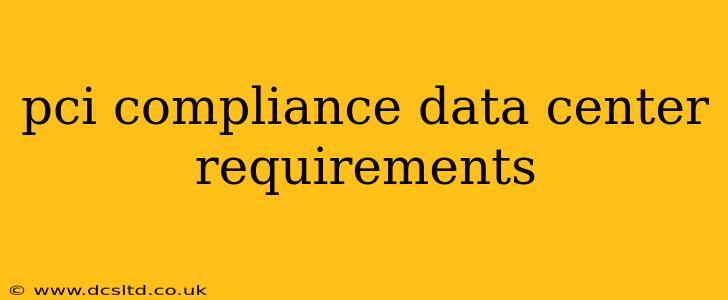The Payment Card Industry Data Security Standard (PCI DSS) is a set of security standards designed to ensure that ALL companies that accept, process, store or transmit credit card information maintain a secure environment. Meeting these standards is crucial for protecting sensitive data and avoiding hefty fines. This guide delves into the specific data center requirements mandated by PCI DSS. While PCI DSS doesn't directly regulate data centers themselves, it dictates stringent security controls that data centers must implement to ensure compliance for their clients. Let's explore the key aspects.
What is PCI DSS Compliance?
PCI DSS compliance isn't just a checklist; it's a comprehensive security framework encompassing twelve key requirements. These requirements cover a wide range of security measures, from network security to access control and vulnerability management. For data centers housing sensitive cardholder data, achieving and maintaining compliance is paramount. Failure to comply can result in significant financial penalties, reputational damage, and loss of customer trust.
Key PCI DSS Data Center Requirements
Several PCI DSS requirements directly impact data center operations and infrastructure. While the standard doesn't explicitly list "data center requirements," the principles translate into specific actions data centers must take:
1. Build and Maintain a Secure Network
This is arguably the most critical aspect. Data centers must implement robust network security measures, including:
- Firewall Configuration: Strong firewalls are essential to control network access and prevent unauthorized connections. Regular updates and proper configuration are vital.
- Intrusion Detection/Prevention Systems (IDS/IPS): These systems monitor network traffic for malicious activity and can automatically block or alert on suspicious behavior.
- Vulnerability Scanning: Regular vulnerability scans identify and address weaknesses in the network infrastructure. This proactive approach is crucial to prevent attacks.
- Secure Network Segmentation: Isolating sensitive systems and data from the rest of the network limits the impact of a breach.
2. Protect Cardholder Data
This extends to various aspects within the data center:
- Data Encryption: Data at rest and in transit must be encrypted using strong encryption algorithms. This protects data even if a breach occurs.
- Access Control: Strict access control measures must be in place, limiting access to sensitive data to only authorized personnel. This includes multi-factor authentication (MFA).
- Data Retention Policies: Clear guidelines on data retention are necessary, ensuring that cardholder data is kept only for as long as needed and then securely disposed of.
3. Maintain a Vulnerability Management Program
This involves:
- Regular Security Assessments: These assessments identify potential weaknesses in the system, allowing for proactive remediation.
- Penetration Testing: Simulating real-world attacks helps identify vulnerabilities that might be missed by other security measures.
- Patch Management: Prompt patching of software vulnerabilities is critical to prevent exploitation by attackers.
4. Implement Strong Access Control Measures
This includes:
- Unique User IDs: Each user must have a unique ID and password.
- Password Management: Strong password policies are crucial, including regular password changes and complexity requirements.
- Access Rights: Users should only have access to the data and systems they absolutely need to perform their job functions (principle of least privilege).
Frequently Asked Questions (FAQs)
What are the penalties for PCI non-compliance?
Penalties for PCI non-compliance vary depending on the severity of the violation and the size of the business. They can range from fines to legal action and reputational damage.
Does PCI DSS apply to all businesses?
PCI DSS applies to any business that accepts, processes, stores, or transmits credit card information. The specific requirements vary depending on the level of involvement with cardholder data.
How can a data center ensure PCI compliance for its clients?
Data centers can ensure PCI compliance for their clients by implementing robust security measures, providing transparent reporting, and offering regular security assessments. They should also work closely with their clients to ensure that their systems and processes align with PCI DSS requirements.
What is the role of security audits in PCI DSS compliance?
Regular security audits are crucial for verifying compliance. These audits validate that the implemented security controls are effective and that the organization is adhering to PCI DSS requirements.
How often should a data center undergo PCI DSS assessments?
The frequency of PCI DSS assessments depends on the level of risk and the specific requirements of the organization. However, regular assessments are crucial for maintaining compliance.
By understanding and adhering to these PCI DSS data center requirements, businesses can significantly reduce their risk of data breaches and ensure the protection of sensitive cardholder information. Remember that this is a complex area, and seeking expert advice is crucial for ensuring complete compliance.
